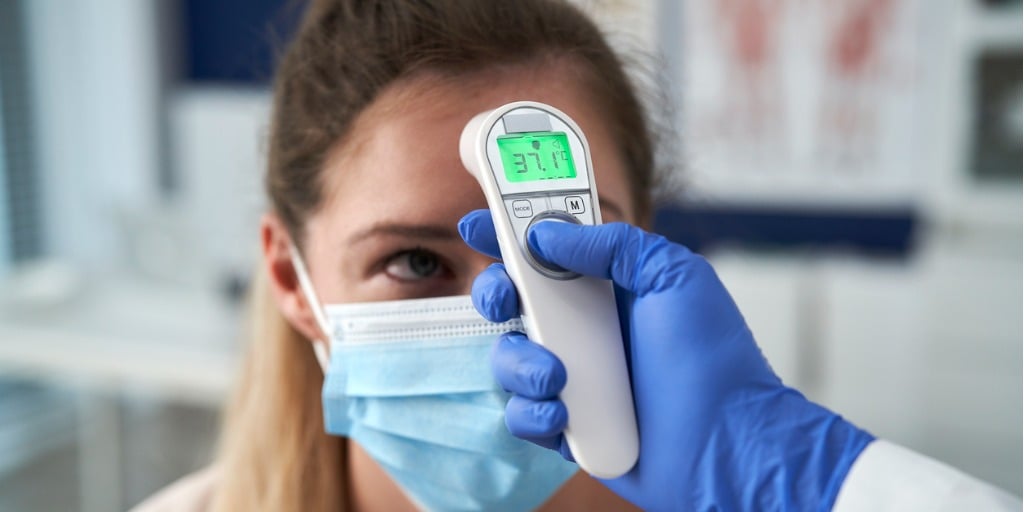Invented in 1867, the medical thermometer is still one of the most widely used medical devices in healthcare. Since the accuracy and reliability of the temperature reading depends on the temperature measuring point used, choosing the right thermometer for your healthcare setting is important.
This article will explore the types of medical thermometers available, their strengths and weaknesses, and features to consider when evaluating thermometers.
As the only medical equipment distributor focused solely on equipment CME Corp. can help you source the best medical grade thermometers for your facility.
Buying Guide Contents:
- The Importance of Medical Thermometers
- Comparing Types of Thermometers and Their Uses
- Key Thermometer Features to Consider
- Medical Thermometer Brands
- Medical Thermometer Buying Guide FAQs
The Importance of Medical Thermometers
The basic function of medical thermometers is the measurement of core body temperature to assess health conditions, monitor fever, and guide medical treatment. Fluctuations in core body temperature can be a sign of illness or infection. While temperature readings taken during treatment can be an indicator of whether the treatment is having a positive effect combating the medical condition causing changes in core temperature.
Core body temperature readings can vary depending on where and how the temperature is taken. For that reason, there are several types of medical thermometers on the market.
Comparing Types of Thermometers and Their Uses
Medical thermometers are available in a variety of types, each with benefits and drawbacks. The table below offers a summary comparison of these thermometers. For more detailed information about the types of medical thermometers, read the post Types of Medical Thermometers.
| Type of Medical Thermometer | Benefits | Drawbacks | Best Setting |
|
Digital Oral Thermometer |
|
May not be suitable for young children or uncooperative patients |
Doctor’s Office |
|
Infrared Forehead Thermometer |
|
|
Hospital/Doctor’s Office |
|
Tympanic Thermometer |
|
|
Hospital/Doctor’s Office |
|
Temporal Artery Thermometer |
|
|
Hospital/Doctor’s Office |
|
Mercury-Free Glass Thermometer |
|
Compared to digital thermometers, the results take longer to process |
Doctor’s Office |
|
Ingestible Thermometer |
|
Invasive and may not be suitable for all patients |
Hospital |
|
Axilla Thermometer |
Easy to use |
Unreliable reading because air can pass under the armpit. |
Hospital/Doctor’s Office |
Key Thermometer Features to Consider
While the choice of medical thermometer is defined by the intended use, medical setting, patients, and the preferences of the healthcare professional there are some universal features to look for.
Accuracy
Look for thermometers with published accuracy specifications. Manufacturers of quality medical thermometers will often voluntarily comply with ASTM standards for each type of thermometer manufactured. To be considered medical grade, thermometers must be accurate within a tolerance of +/-0.2°C according to ASTM standard.
Speed
For many clinicians, assessing a patient’s temperature must be done quickly. Look for medical thermometers with digital or infrared features for faster temperature recording.
Temperature Recording Features
Medical thermometers used for vital signs monitoring are increasingly EMR/EHR compatible. Look for devices that are labeled EMR Ready or EMR Compatible. Other thermometers may offer a memory feature that can save previous temperature readings.
Display
Choose thermometers with clear and easy to read displays. If a medical thermometer is likely to be used in low light conditions, look for backlit screens or larger numbers for better visibility.
Hygiene
Medical thermometers should be easy to clean and disinfect. Look for thermometers that are water or disinfectant proof. You may also want to consider accessories such as disposable probe covers to maintain proper infection control standards. Individual use thermometers are also an option.
Battery Life
Nothing is worse than a low or dead battery. Look for medical thermometers with long life batteries or rechargeable batteries and a charging station.
Celsius to Fahrenheit Conversion
Since thermometers used in clinical settings measure only a small range of temperatures, the Celsius scale is preferred. If there is a potential need for temperature readings in Fahrenheit, look for thermometers with a conversion feature.
Durability
Medical thermometers should be made of durable material such as heavy-duty plastic or stainless steel. Look for impact resistant or shock absorbent casings and very few loose or fragile parts. Water damage in the medical environment is a common cause of thermometer malfunction. Consider waterproof or water-resistant medical thermometers.
Ease of Use Features
Generally speaking, medical thermometers are easy to use, especially in the hands of medical professionals. However, there are available features that can make taking a temperature easier. Look for beep or other indicator features to notify the practitioner the reading is complete. Also consider features that allow the thermometer to adjust to a patient’s age for a more accurate readout.
Versatility
Through the use of different tips, some medical thermometers can be used to record body temperature from different locations.
Medical Thermometer Brands
-2.png?width=1024&height=200&name=Untitled%20design%20(5)-2.png)
CME has cultivated relationships with the leading medical thermometer manufacturers and can help you source the best thermometer for the needs of your facility, staff, and patients.
Shop CME Corp.'s wide selection of medical thermometers.
Medical Thermometer Guide Summary
As with most purchases it is important to define the needs of the facility, the staff, and the patients served. Medical thermometers are available to fit a wide range of healthcare needs. Taking time to explore the many available features, benefits, and drawbacks of each type of thermometer is time well spent. By making an informed purchase you are helping to ensure patient comfort, clinical accuracy, and staff satisfaction.
CME Corp. Is Your Source for Medical Thermometers
 CME Corp is the only medical equipment distributor in the United States solely focused on medical equipment. Over the last forty years we have built relationships with the leading medical equipment manufacturers in the healthcare industry. Our expert account managers can help you work with these manufacturers to purchase medical thermometers specific to the healthcare services you offer and the patient populations you serve, all within your budget.
CME Corp is the only medical equipment distributor in the United States solely focused on medical equipment. Over the last forty years we have built relationships with the leading medical equipment manufacturers in the healthcare industry. Our expert account managers can help you work with these manufacturers to purchase medical thermometers specific to the healthcare services you offer and the patient populations you serve, all within your budget.
When purchasing a large volume of thermometers for a project, our Direct-to-Site services and Biomedical Services team can assist your team with incoming inspection, delivery, and startup services. We can provide the support to tag medical thermometers, using your asset control tags, to streamline the process of entering these assets into your control system.
Click CHAT to talk with a CME expert about your medical thermometer needs.
Medical Thermometer Buying Guide FAQs
What types of thermometers do hospitals use?
Hospitals use medical thermometers (also known as clinical thermometers). The most common types used by hospitals are Tympanic, Axilla, Rectal, and Non-Contact Infrared thermometers.
What types of thermometers do doctors use?
Doctors use medical thermometers (also known as clinical thermometers). The most common types used in doctor’s offices are digital, electronic ear, and forehead thermometers.
Are there special considerations when choosing medical thermometers for us in hospitals or clinical settings?
Medical thermometers used in hospital or clinical settings should be constructed of heavy-duty plastic or other material able to withstand frequent cleaning and is water resistant. Shock absorbent casing are also an important consideration as thermometers are frequently dropped or bumped.
What is the lifespan of medical thermometers?
Most digital medical thermometers will last about 3-5 years. Check with the manufacturer for suggested replacement frequency.
About CME: With two corporate offices and 35+ service centers, CME Corp is the nation’s only equipment focused medical equipment distributer. We are the premier source for more than 2 million healthcare equipment products, from more than 2,000 manufacturers.
Our Turnkey logistics and biomedical services allow us to help healthcare facilities nationwide reduce the cost of the equipment they purchase, make their equipment selection, and schedule delivery, installation, and maintenance without impacting patient care. From medical equipment purchases to renovations and new facility construction CME Corp is your partner for seamless capital medical equipment purchases, delivered on time and in budget.



